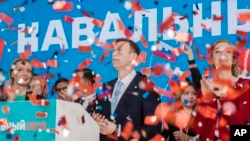Russian anticorruption activist and opposition politician Aleksei Navalny says he has gathered enough endorsements to run in the country's next presidential election as his supporters organized rallies in 20 cities across Russia to secure the signatures.
An outspoken Kremlin critic, Navalny is barred from running in the March 18, 2018, election because of a criminal conviction that he says is politically motivated. Navalny could run if the conviction is canceled or if he gets a special dispensation.
Navalny spoke at the Moscow rally on December 24, branding Russian President Vladimir Putin a “bad president.”
Some 800 Navalny supporters gathered for the formal endorsement meeting under a giant marquee on a snow-covered riverside in Moscow. The endorsement was observed by officials from the Central Election Commission attended the gathering.
Similar events took place in 19 other cities, including Vladivostok, Novosibirsk, Perm, Omsk, and Krasnoyarsk.
Navalny has said that according to the law, he needed 500 nominations in each of 20 cities across the country.
He later tweeted that he had secured the signatures, saying: "I have become an official candidate nominated by activist groups of voters. Many thanks to those who have taken part in this campaign in all corners of our country. You are the best."
Police stopped a van carrying 11 opposition activists who were on their way to take part in pro-Navalny rallies in Volgograd, opposition supporter Arsentiy Gundarev said. He said police seized the activists’ passports and other documents.
Navalny had also given his backing to an event in Moscow on December 24 organized by Ilya Yashin, an activist and ally of late opposition leader Boris Nemtsov, who is also a local legislator in Moscow.
Yashin had dubbed the event a “Day of Free Elections” festival, which he planned to hold in Moscow’s Lermontov Park. On December 20, the Moscow City Court banned the rally, a move Human Rights Watch said is an example of the Kremlin's crackdown on the opposition.
Yashin tweeted on December 24 that “the atmosphere is getting tense here. There are police at the entrance of my house. Several officers entered the house.”
Yashin said on Facebook that he considers the ban “politically motivated and illegal.”
He had argued earlier that as a legislator he did not need the city’s approval to hold the event, which he qualified was a “festival” and not a “demonstration.”
Political rallies in Russia require approval from the authorities.
"The refusal by Moscow authorities to sign off on the planned December 24 rally in support of fair elections is yet another example of how Russian officials use formal pretexts to ban events by the political or civic opposition," said Tanya Lokshina, the head of the Moscow branch of Human Rights Watch.
"In spring and summer this year, government critics in numerous cities across Russia held peaceful anticorruption protests that authorities refused to authorize, and police detentions were massive and arbitrary.
"In fact, in the first six months of 2017 alone, the number of people administratively punished by Russian authorities for supposedly violating the country’s regulations on public gatherings was 2 1/2 times higher than throughout 2016," Lokshina explained to RFE/RL in an e-mail.
Yashin had spelled out earlier on his Facebook page why he was organizing the event.
“We will tell people about their electoral rights, which are guaranteed by the constitution. We will organize the registration of people who are prepared to work as monitors. We will put up a stage, invite musicians, and give out souvenirs dedicated to free elections,” Yashin wrote.
Throwing his backing behind the event, Navalny commented on his blog that December 24 was a “beautiful date” to hold a rally, writing, “We will remember December 24, 2011.”
Navalny posted pictures of the tens of thousands who demonstrated in Moscow on that day in 2011. Those protests culminated on May 6, 2012, on the eve of Putin’s inauguration for a third term as Russian president, when hundreds of people were arrested on Moscow’s Bolotnaya Square while demonstrating.
Speaking to RFE/RL’s Russian Service on December 4, Navalny ally Vladimir Milov said it is wrong to expect Navalny’s campaign will give up if or when he is officially barred from running.
“That will only be the start of it,” Milov said, claiming they will dispute the decision in court and “fight for Navalny’s registration until March 18,” the scheduled date of the election, and beyond.
Navalny published his full election platform last week, focusing on fighting corruption and channeling more money into education and health care. He calls for a windfall tax on oligarchs and huge cuts to Russia's bloated bureaucracy.
Putin announced his decision to run for a fourth term on December 6. His high approval ratings and control over the levers of power make his victory a foregone conclusion in Russia, where government critics say election campaigns and results are manipulated by the authorities.
Analysts say Putin is eager to score a strong win in a vote with a high turnout in order to make his mandate as strong as possible in what could be his final six-year term, as the constitution bars presidents from serving more than two consecutive terms.






